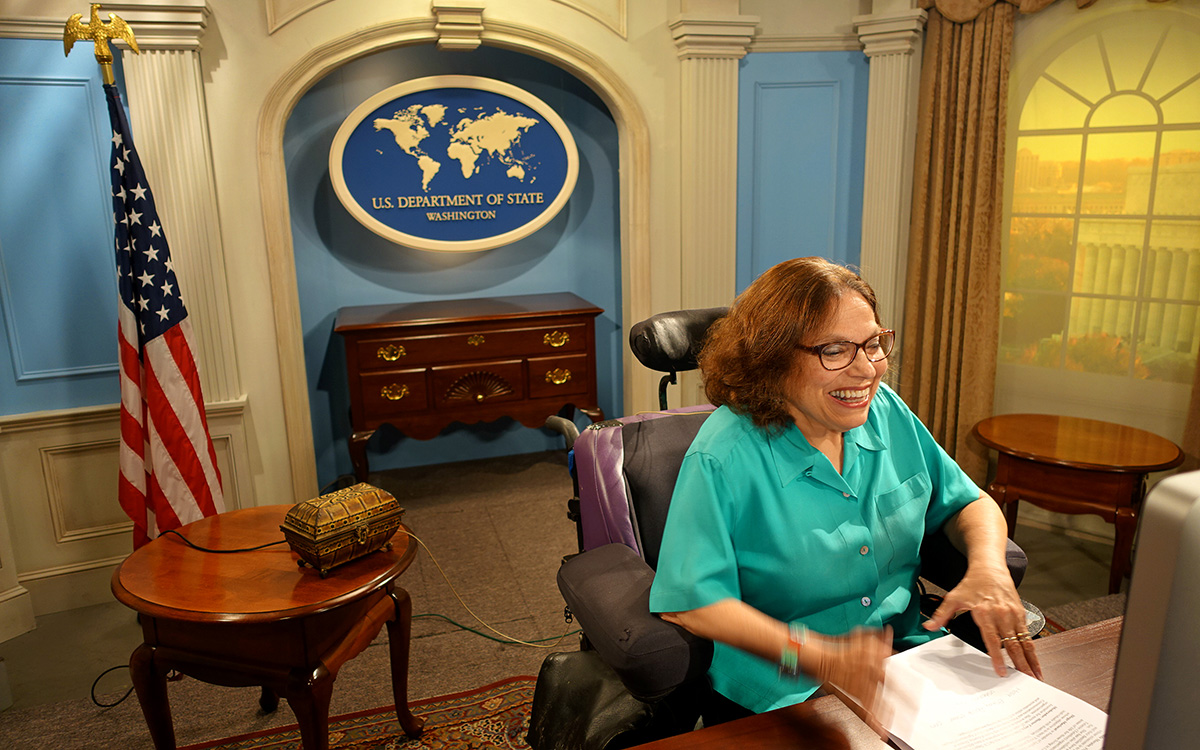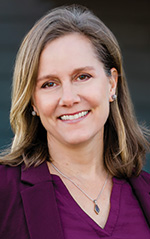A Prime Mover for Disability Rights: Judith Heumann (1947–2023)
BY DONNA SCARAMASTRA GORMAN

Special Adviser for International Disability Rights Judith Heumann participating in an August 2015 Google Hangout, discussing the influence of the Americans with Disabilities Act (ADA) and its effect in the U.S. and Latin America.
U.S. Department of State
Disability rights activist and author Judith Heumann, 75, died in Washington, D.C., on March 4, 2023.
Often called “the mother of the disability rights movement” by activists around the world, Ms. Heumann served as the State Department’s first special adviser on international disability rights from 2010 to 2017, a position that was created after the U.S. signed the Convention on the Rights of Persons with Disabilities (Disabilities Treaty).
In her role as adviser, Heumann traveled to numerous overseas posts to meet with people with disabilities, civil society organizations, and government officials, teaching others to champion and advocate for disability rights in their countries. Heumann also worked to ensure that the needs of people with disabilities would be addressed in international emergency situations and coordinated the interagency process for ratification of the Disabilities Treaty.
Sadly, the U.S. remains one of a few countries that still have not ratified the treaty. In a 2016 TED talk, Heumann pushed for the U.S. Senate to “do its job” and ratify the treaty, reminding her audience that they should join the fight for disabled rights. “Disability is a family you can join at any point in your life,” she added.
After Ms. Heumann’s death, State Department spokesperson Ned Price released a statement: “To say Judy was instrumental in the disability rights movement is an understatement. She embodied the collective fight for the rights of all people with disabilities throughout a multitude of roles and platforms—legal, political, and social. Legislation such as the Americans with Disabilities Act, Section 504 of the Rehabilitation Act of 1973, the Individuals with Disabilities Education Act and the U.N. Convention on the Rights of Persons with Disabilities would not exist without Judy’s leadership alongside her pioneering fellow advocates.”
Ms. Heumann was born in 1947 to parents who fled Nazi Germany as children; her grandparents and other family members were murdered in the Holocaust. When she contracted polio as a toddler and lost the use of her legs, her parents refused to institutionalize her, perhaps, as she wrote in her memoir, Being Heumann: An Unrepentant Memoir of a Disability Rights Activist (2020), because they came from a country where families were routinely separated as “part of a campaign of systemic dehumanization and murder.” Instead, they fought to have her admitted to her local public school.
Heumann planned to be a teacher, but after graduating from Long Island University with a degree in speech therapy and theater in 1969, she was told she could not teach in New York City schools because she’d be unable to assist in the event of an evacuation. She sued the school district and won, along the way becoming known as a disability rights leader.
Disability only becomes a tragedy when society fails to provide the things we need to lead our lives.
—Judith Heumann
She went on to push for federal anti-discrimination laws, which were signed by then-President Richard Nixon, and to demonstrate for the passage of Section 504, a federal statute prohibiting discrimination on the basis of disabilities, leading a group in a 26-day occupation of a federal government building in San Francisco.
The “504 Sit-in” represented the first time that people with differing abilities joined forces to enact legislation, and it worked: When authorities cut power and phone lines to the building, deaf participants used sign language to maintain contact with outside supporters, allowing protestors to continue their sit-in.
After earning a master’s degree in public health from the University of California, Berkeley, in 1975, Heumann co-founded the landmark Berkeley Center for Independent Living, serving as deputy director until 1982. She then co-founded Berkeley’s World Institute on Disability.
In 1993 Heumann moved to Washington, D.C., to join the Clinton administration as assistant secretary of education overseeing all federal educational programs for children with disabilities. She then worked for the World Bank from 2002 to 2006 before becoming the State Department’s special adviser on disability rights during the Obama administration.
AFSA President Eric Rubin remembers meeting Heumann when she visited Moscow while he was serving as deputy chief of mission (DCM): “Judith visited Embassy Moscow in 2010 during the Passover holiday, and we invited her to join us for our Passover Seder. She asked if our residence was accessible to someone in a wheelchair, but after extensive consultation with our embassy team, we concluded that there was no way for someone in a wheelchair to enter the DCM residence without being carried up the steps. Judith thanked us for the invitation, but said that as a matter of principle, she was not willing to be carried. This was a significant reminder of the need for accessible housing, and the practical cost of having inaccessible U.S. government facilities.” (In 2023 the DCM residence in Moscow is still not wheelchair accessible.)
NPR correspondent Joseph Shapiro recalls that in 1987 Heumann told him: “Disability only becomes a tragedy when society fails to provide the things we need to lead our lives—job opportunities or barrier-free buildings, for example. It is not a tragedy to me that I’m living in a wheelchair.”
Heumann was featured in a 2020 documentary, “Crip Camp: A Disability Revolution,” about Camp Jened, a pioneering summer camp for children with disabilities. She also co-wrote a book for young readers, Rolling Warrior: The Incredible, Sometimes Awkward, True Story of a Rebel Girl on Wheels Who Helped Spark a Revolution (2021). She was the host of the podcast The Heumann Perspective, which featured conversations about disability culture, entertainment, and advocacy.
Heumann is survived by her spouse, Jorge Pineda, and her brothers, Ricky and Joseph.
When sharing or linking to FSJ articles online, which we welcome and encourage, please be sure to cite the magazine (The Foreign Service Journal) and the month and year of publication. Please check the permissions page for further details.



